Happiness Is A Choice: Barry Neil Kaufman
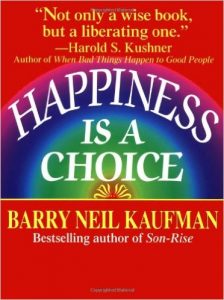 This is a delightful little book that many years ago changed my thinking in the right direction. Kaufman— who has been through more than his share of trials and tribulations— makes a clear and convincing case for the fact that it is always how we react to what happens to us that determines our level of happiness, not the events themselves. I found Kaufman’s ideas convincing—at least in theory—and his real-life examples of people reacting calmly, positively even, in the face of calamities, moving and inspiring.
This is a delightful little book that many years ago changed my thinking in the right direction. Kaufman— who has been through more than his share of trials and tribulations— makes a clear and convincing case for the fact that it is always how we react to what happens to us that determines our level of happiness, not the events themselves. I found Kaufman’s ideas convincing—at least in theory—and his real-life examples of people reacting calmly, positively even, in the face of calamities, moving and inspiring.
While I was persuaded by him that happiness is, indeed, a choice (as opposed to a matter of luck, or of having the right genes), I was frustrated at the time I read it by my personal inability to make the choice to be happy. It was only when I discovered EFT that I was able to integrate this helpful philosophy into my life and truly figure out how to be happy.
1994, 286pp, paperback, Fawcett Columbine New York
Man’s Search For Meaning: Viktor E. Frankl
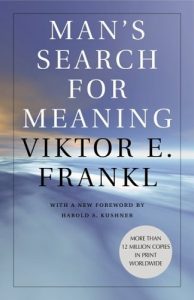
One of my most treasured books. Viktor Frankl, a gifted Viennese psychiatrist, survived years in Nazi death camps, managing not only to keep his own spirit and humanity intact, but also to reach out to help others. It’s remarkably uplifting book about the power we have to transcend even the most horrific circumstances.
2006, 165 pp, paperback, Beacon Press
Liberated Parents, Liberated Children: Adele Faber and Elaine Mazlish
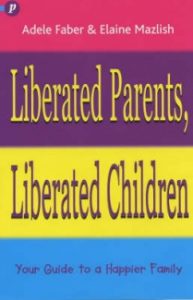 A truly excellent and highly readable book on parenting. It’s full of valuable psychological principles (eminently applicable to adults, too) and offers extremely helpful advice. (Give me an over-tired, thirsty, toddler stuck in back-to-back traffic, and I know just what to do!) I credit it largely for the lovely time I’ve had raising my chidren from babyhood to young adulthood. I must have read at least a hundred books on parenting over the years: for me, this one stands head and shoulders above the rest. There’s a companion workbook, with cartoons, called “How to Talk So Kids Will Listen and Listen So Kids Will Talk,” which is also great, but Liberated Parents is the best place to start.
A truly excellent and highly readable book on parenting. It’s full of valuable psychological principles (eminently applicable to adults, too) and offers extremely helpful advice. (Give me an over-tired, thirsty, toddler stuck in back-to-back traffic, and I know just what to do!) I credit it largely for the lovely time I’ve had raising my chidren from babyhood to young adulthood. I must have read at least a hundred books on parenting over the years: for me, this one stands head and shoulders above the rest. There’s a companion workbook, with cartoons, called “How to Talk So Kids Will Listen and Listen So Kids Will Talk,” which is also great, but Liberated Parents is the best place to start.
2002, 270 pp, paperback, Piccadilly Press Ltd
Influence—The Psychology of Persuasion: Robert Cialdini
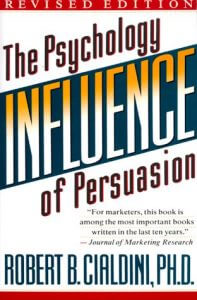 A fascinating, well-documented and highly readable study of how we are persuaded, often unconsciously, to comply with requests we later wish we’d simply said “no” to. The book covers the strategies used by salesmen, how the police extract confessions, how cults work, and explores why we humans sometimes act like sheep. It effectively teaches one how to avoid getting conned (in the wrong hands, it could also serve as a rather thorough how-to manual for conning people!). It also contains invaluable (potentially life-saving) advice on how to get help from passersby in an emergency.
A fascinating, well-documented and highly readable study of how we are persuaded, often unconsciously, to comply with requests we later wish we’d simply said “no” to. The book covers the strategies used by salesmen, how the police extract confessions, how cults work, and explores why we humans sometimes act like sheep. It effectively teaches one how to avoid getting conned (in the wrong hands, it could also serve as a rather thorough how-to manual for conning people!). It also contains invaluable (potentially life-saving) advice on how to get help from passersby in an emergency.
1999, 336 pp, paperback, Quill, William Morrow, New York
Finding Flow: Mihaly Csikszentmihalyi
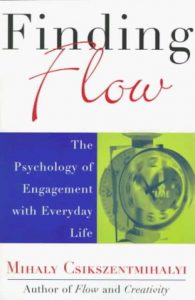 This book made me redefine my view of what it means to feel happy; it’s one I often lend to friends and clients. Csikszentmihalyi (pronounced Chick-sent-me-high) basically suggests that the pursuit of what he calls flow is a more meaningful (and achievable) goal than the pursuit of happiness. Flow comes from being thoroughly absorbed in a task that is a) challenging, b) requires concentration, c) stretches one’s limits, and d) offers immediate feedback; in this state, one is essentially too engaged and focused to analyse whether or not one is happy per se—hence one is, effectively, happy. (Examples of flow activities would be: playing chess, skiing a new piste, simultaneous translating. Watching TV does not meet the criteria, in that it is largely passive and generally does not require one’s brain to be firing away on all cylinders. Csikszentmihalyi notes that, sadly, for many adults, a brief trip in the car can provide the only source of flow on a given day.) I found a pie chart in the book particular food for thought; mentally dividing your day up into blocks of time and seeing how many of those blocks include flow-producing activities is a salutary exercise. And I’ve realised that one of the reasons that I love doing EFT with clients so much is that it is highly likely, if not guaranteed, to put us both in a state of flow.
This book made me redefine my view of what it means to feel happy; it’s one I often lend to friends and clients. Csikszentmihalyi (pronounced Chick-sent-me-high) basically suggests that the pursuit of what he calls flow is a more meaningful (and achievable) goal than the pursuit of happiness. Flow comes from being thoroughly absorbed in a task that is a) challenging, b) requires concentration, c) stretches one’s limits, and d) offers immediate feedback; in this state, one is essentially too engaged and focused to analyse whether or not one is happy per se—hence one is, effectively, happy. (Examples of flow activities would be: playing chess, skiing a new piste, simultaneous translating. Watching TV does not meet the criteria, in that it is largely passive and generally does not require one’s brain to be firing away on all cylinders. Csikszentmihalyi notes that, sadly, for many adults, a brief trip in the car can provide the only source of flow on a given day.) I found a pie chart in the book particular food for thought; mentally dividing your day up into blocks of time and seeing how many of those blocks include flow-producing activities is a salutary exercise. And I’ve realised that one of the reasons that I love doing EFT with clients so much is that it is highly likely, if not guaranteed, to put us both in a state of flow.
1998, 288 pp, paperback, Basic Books
The Healing Power of EFT & Energy Psychology: David Feinstein, Donna Eden and Gary Craig
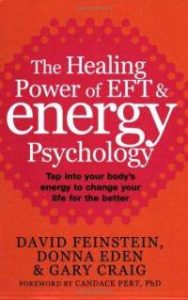 This book takes a fairly thorough look at EFT in the context of the emerging field of energy psychology. It includes a description of how to do EFT, case histories as examples, and thoughts on various different energy systems in our bodies. One of the authors, Donna Eden, is a natural healer who has an ability to “see” energy. David Feinstein, a clinical psychologist (and Eden’s husband), writes with engaging charm about his profound initial resistance to, and skepticism of, the idea of “subtle energy.” His tone is clear, simple and rational.
This book takes a fairly thorough look at EFT in the context of the emerging field of energy psychology. It includes a description of how to do EFT, case histories as examples, and thoughts on various different energy systems in our bodies. One of the authors, Donna Eden, is a natural healer who has an ability to “see” energy. David Feinstein, a clinical psychologist (and Eden’s husband), writes with engaging charm about his profound initial resistance to, and skepticism of, the idea of “subtle energy.” His tone is clear, simple and rational.
He was ultimately persuaded — as many of us have been with EFT — to open his mind (and switch his professional focus) by repeatedly witnessing the remarkably positive results of energy work.
This is a clearly written and informative book which provides interesting background on EFT, and contains an interesting Appendix showing the research evidence to date.
2006, 321pp, paperback, Piatkus Books Ltd London (e-mail info@piatkus.co.uk)
Attracting Abundance with EFT: Carol Look, LCSW, DCH
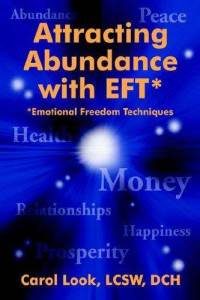 I find it interesting how many of us have blocks to making more money or to even to the very idea of abundance. This book has definitely shifted my perspective (though I still like to think I’m not “greedy!”). To quote from the back of the book: “If you are tired of not having enough money, time, love, or success, this exciting new book is for you. It combines the simplicity of EFT, the fun of Abundance Games, and the power of the Law of Attraction to help you increase your financial abundance and magnetize success into your life.” An endorsement from Cheryl Richards (New York Times Bestseller author) reads as follows: “Attracting Abundance with EFT provides you with superb practical tools that will show you fun, easy ways to shift your limiting beliefs (and your energy) so you can create more success in all areas of your life!”
I find it interesting how many of us have blocks to making more money or to even to the very idea of abundance. This book has definitely shifted my perspective (though I still like to think I’m not “greedy!”). To quote from the back of the book: “If you are tired of not having enough money, time, love, or success, this exciting new book is for you. It combines the simplicity of EFT, the fun of Abundance Games, and the power of the Law of Attraction to help you increase your financial abundance and magnetize success into your life.” An endorsement from Cheryl Richards (New York Times Bestseller author) reads as follows: “Attracting Abundance with EFT provides you with superb practical tools that will show you fun, easy ways to shift your limiting beliefs (and your energy) so you can create more success in all areas of your life!”
2006, 170pp, paperback, AuthorHouse, Indiana
BUY THIS BOOK
Emotional Healing in Minutes. Simple Acupressure Techniques for your Emotions: Valerie and Paul Lynch
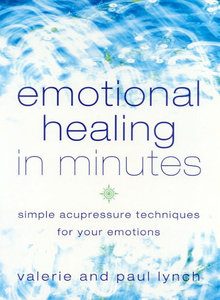 A fairly basic, but thorough, guide to EFT for the newcomer (with a brief Foreword by Gary Craig). The explanations are clear and straightforward, and there are some helpful, and rather elegant, accompanying diagrams and charts. The tone is personal, warm and encouraging. This book may appeal particularly to a UK audience: the style is quite British. The authors are a married couple: he is trained in NLP as well as EFT; she is a Reiki Master as well as an EFT therapist, and runs the Heart Centre in Eastbourne, England.
A fairly basic, but thorough, guide to EFT for the newcomer (with a brief Foreword by Gary Craig). The explanations are clear and straightforward, and there are some helpful, and rather elegant, accompanying diagrams and charts. The tone is personal, warm and encouraging. This book may appeal particularly to a UK audience: the style is quite British. The authors are a married couple: he is trained in NLP as well as EFT; she is a Reiki Master as well as an EFT therapist, and runs the Heart Centre in Eastbourne, England.
2001, 228pp, paperback, Thorsons (part of HarperCollinsPublishers) London
Healing Back Pain: John E. Sarno, M.D.
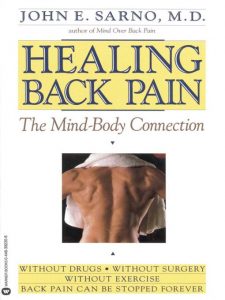 This is another book I often lend to clients. Dr. Sarno, a professor of Clinical Rehabilitation Medicine at the New York University School of Medicine, examines the emotional underpinnings of back pain and neck and shoulder tension. He argues, persuasively, that most people suffering from back pain can heal themselves without exercise or other physical therapy. While EFT is not mentioned in the book (which is over ten years old), it is obviously an excellent way of resolving the anxiety and repressed anger (which Sarno sees as chief culprits) that can trigger muscle spasms and lead to back pain. (John Stossel, a correspondent for the television show 20/20, is quoted elsewhere as stating: “I had considered Dr. Sarno’s idea preposterous, but ten years ago I was talked into seeing him. I haven’t had back problems since.” I would add my endorsement to this: I used to think of myself as someone with a bad back, but since reading Sarno’s book, the thought rarely crosses my mind.
This is another book I often lend to clients. Dr. Sarno, a professor of Clinical Rehabilitation Medicine at the New York University School of Medicine, examines the emotional underpinnings of back pain and neck and shoulder tension. He argues, persuasively, that most people suffering from back pain can heal themselves without exercise or other physical therapy. While EFT is not mentioned in the book (which is over ten years old), it is obviously an excellent way of resolving the anxiety and repressed anger (which Sarno sees as chief culprits) that can trigger muscle spasms and lead to back pain. (John Stossel, a correspondent for the television show 20/20, is quoted elsewhere as stating: “I had considered Dr. Sarno’s idea preposterous, but ten years ago I was talked into seeing him. I haven’t had back problems since.” I would add my endorsement to this: I used to think of myself as someone with a bad back, but since reading Sarno’s book, the thought rarely crosses my mind.
1991, 193 pp, paperback, Warner Books
Unlimited Power by Anthony Robbins
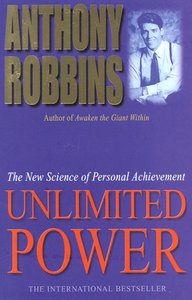 Subtitled The New Science of Personal Achievement, this is the sort of book that might at first glance turn people off, particularly those prone to thinking “aarg! not another self-help book!” However, it’s not a bestseller for nothing. Although the back cover doesn’t say so (it describes the book as “a revolutionary fitness book for the mind”) Robbins is basically teaching the principles of NLP, or Neuro-Linguistic Programming.
Subtitled The New Science of Personal Achievement, this is the sort of book that might at first glance turn people off, particularly those prone to thinking “aarg! not another self-help book!” However, it’s not a bestseller for nothing. Although the back cover doesn’t say so (it describes the book as “a revolutionary fitness book for the mind”) Robbins is basically teaching the principles of NLP, or Neuro-Linguistic Programming.
NLP (if you don’t already know about it) is much less scary than its name, and can be used to extremely good effect alongside EFT. NLP concepts with fancy names include “reframing” (finding another way of looking at an issue) and modeling (identifying someone who would be a good role model for yourself, then figuring out and copying his or her strategies), as well as “anchoring,” a nifty little trick I use a lot with my clients and which can be learned in minutes. So, in a nutshell (despite the book’s jargon and breathless style) I recommend this.
2001, 448 pp, paperback, Pocket Books
Stop Smelling My Rose!: Jennifer Davidson, with illustrations by Ann Arnold
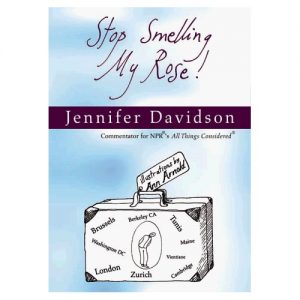 This is a collection of short, humorous/philosophical, personal essays, many of them broadcast in the US on National Public Radio’s “All Things Considered,” on a variety of topics—including a rather comical meeting I had with Mr T. when I worked on the Larry King Show, and a piece I’m oddly fond of called called Bert, Ernie and Kierkegaard.
This is a collection of short, humorous/philosophical, personal essays, many of them broadcast in the US on National Public Radio’s “All Things Considered,” on a variety of topics—including a rather comical meeting I had with Mr T. when I worked on the Larry King Show, and a piece I’m oddly fond of called called Bert, Ernie and Kierkegaard.
Here is the review from the back the back cover:
“Writing with wit, irony and compassion, National Public Radio commentator Jennifer Davidson leads us on a dazzling array of journeys. She travels both to the ends of the earth and straight to the heart, deftly capturing the extraordinary underpinnings of everyday life. Whether evoking the sublime, or the ridiculous (fighting lice, running with rabbits, a woman taking her Christmas tree for a walk), Davidson’s stories are brave, witty, and utterly truthful. Except, of course, for the occasional lie.”
Available from amazon in a Kindle edition (updated, with photographs)
BUY THIS BOOK from amazon.com or amazon.co.uk
Virtual Fidelity: Jennifer Davidson
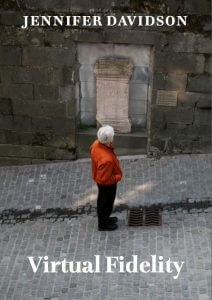 Helen is a woman with a secret. As she struggles with a fraying marriage, an empty nest and forgotten talent as a painter, she’s haunted by the memory of something long past. Michael, her husband of 22 years, is hiding some very powerful secrets of his own. When dramatic revelations about each other’s pasts shake their lives, both will struggle with fidelity and its exact, often elusive, meaning. Virtual Fidelity is above all a humane and truthful portrait of a marrriage—with all its passions and regrets, comic moments, boredom and tenderness.
Helen is a woman with a secret. As she struggles with a fraying marriage, an empty nest and forgotten talent as a painter, she’s haunted by the memory of something long past. Michael, her husband of 22 years, is hiding some very powerful secrets of his own. When dramatic revelations about each other’s pasts shake their lives, both will struggle with fidelity and its exact, often elusive, meaning. Virtual Fidelity is above all a humane and truthful portrait of a marrriage—with all its passions and regrets, comic moments, boredom and tenderness.
Available from amazon.com and amazon.co.uk